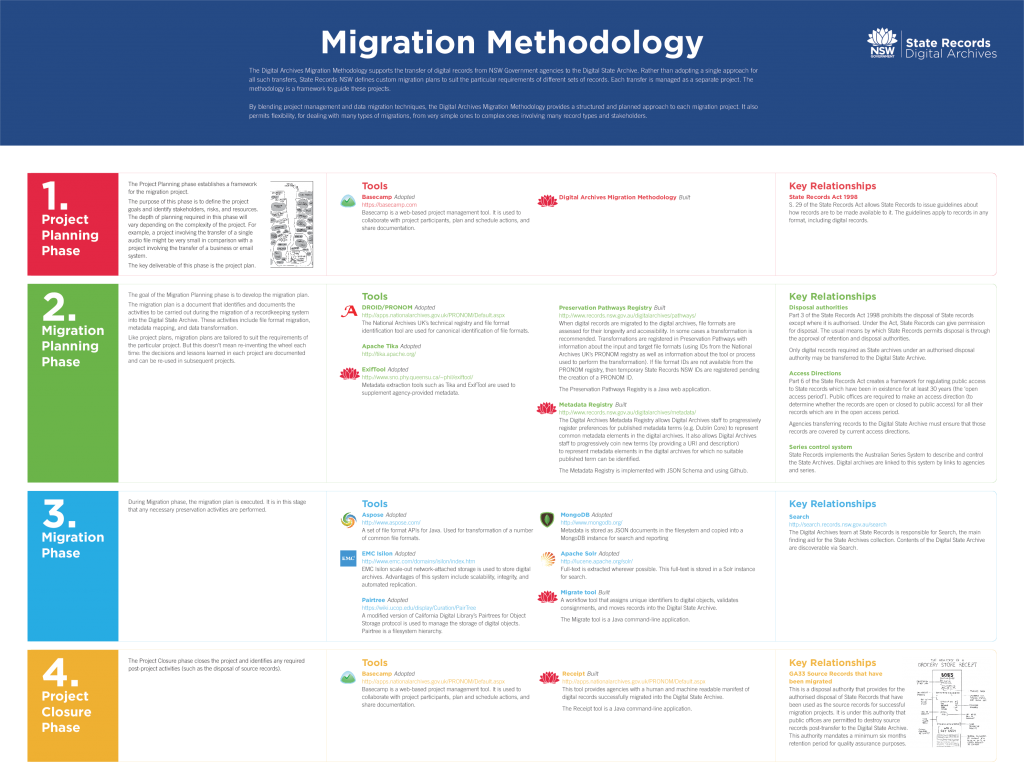Recent digital advice – the challenges currently facing public offices November 25, 2014 No Comments
Recently we’ve been very active out and about talking to public offices about their digital projects and the information management issues they are facing.
Scenarios we talked about included the redevelopment of client management systems, expanding ECM/EDRMS systems to enable collaboration across agencies in a cluster, and the consolidation of enterprise resource planning (ERP) systems. We talked about digital contract management, cloud computing risk assessments, and the proliferation of communication, messaging and collaboration platforms. We talked to a diverse set of organisations: large operational departments, local councils and small specialist agencies. Read the rest of this entry »
Managing information in cloud systems November 7, 2014 No Comments
 This week we had our regular EDRMS (Electronic Document and Records Management System) implementers’ group meeting. The meeting’s topic was managing information in cloud systems. A great thing about this group is the wide range of expertise in the room: today there were records and information managers, information specialists, operations directors and business analysts among the group attending. This reflects the diverse expertise required to deal with today’s records and information management issues.
This week we had our regular EDRMS (Electronic Document and Records Management System) implementers’ group meeting. The meeting’s topic was managing information in cloud systems. A great thing about this group is the wide range of expertise in the room: today there were records and information managers, information specialists, operations directors and business analysts among the group attending. This reflects the diverse expertise required to deal with today’s records and information management issues.
The constant factor was, as always, significant change. People were going through organisational mergers, dealing with the continuing legacy of demergers, and adapting new business models. There was wide agreement in the room that this environment requires a broad information management leadership role; that EDRMS is an important part of a digital organisation, but only part of the solution. A number of excellent examples were related which discussed the expanding, complex role they are increasingly called upon to play. Read the rest of this entry »
Review of General disposal authority: imaged records October 31, 2014 No Comments
State Records is currently reviewing the General disposal authority for imaged records (GA36). This authority authorises the destruction of the originals of records that have been imaged (provided that certain conditions have been met) including records required as State archives or required to be retained in agency. Currently the originals of records required as State archives or required to be retained in agency are only authorised for destruction after imaging if they were created on or after 1 January 2000.The main focus of the review was to examine if an earlier date would be appropriate.
We also sought feedback on issues with technical specifications, metadata requirements, the inclusion of microfilm, exclusions and conditions. We would like to thank all the people who responded to our requests for feedback.
We have now prepared an exposure draft of the revised authority that incorporates the comments received and are seeking feedback on the exposure draft. The main proposed changes are:
- rolling the date range back to 1980 from 2000
- widening the scope of the authority to include source or original records that have been imaged, copied or converted
- adding original film negatives and recordings to the excluded records
- adding to the types of records that are excluded as they have intrinsic value in their original format.
Please forward any feedback on the draft to Angela McGing, Project Officer, Government Recordkeeping, by Friday 21 November at angela.mcging@records.nsw.gov..au
iPres 2014 October 14, 2014 No Comments
Last week the State Records NSW Digital Archives team was in Melbourne for the iPres 2014 Conference. We presented a poster on Thursday outlining our Migration Methodology during the Posters and Demonstrations session. Many conference attendees stopped by to talk about the State Records NSW approach to preserving a digital record of government activity, even after contemporary systems are decommissioned. Some of our visitors requested a copy of the poster to look over in their own time and, for others who were unable to attend, the full scale PDF is attached to this post along with a preview below.
Successful engagement for records and information management projects September 25, 2014 No Comments
This week we had our regular EDRMS implementers group meeting. As usual, a great group of people turned up from a wide range of organisations.
Everyone is at various stages of implementing an EDRMS/ECM system, and many are responsible for a broader range of information management systems. A general theme in the group is a shift away from a monolithic and integration-heavy approaches and towards prioritised approaches.
Today, we were talking about how records and information managers can successfully engage their organisations’ staff with their initiatives. There was a lot of pragmatic discussion about influencing those with the biggest compliance burdens and the most critical or valuable functions. People emphasized the importance of direct engagement to establish exactly how the individuals work and how it best suits them to manage information. A number of useful approaches were presented and discussed by the group.
Have your say – the NSW Digital Government Survey September 16, 2014 No Comments
The NSW Government has established the Accelerating Digital Government Taskforce. The Taskforce has been asked to “deliver a vision and roadmap for a digital government that is agile and
innovative, optimising the value of information assets and digital technologies to anticipate needs and deliver better public services.”
We’re excited by this initiative, which fits in nicely with the work State Records is doing on the digital strategy for records and information.
A survey of people’s views on digital government is being conduct as part of the Taskforce’s work. The survey is available here, and more information about the work of the Taskforce is at http://www.finance.nsw.gov.au/ict/governance/accelerating-digital-government-taskforce.
IPAA Legal Eagle Social Media Seminar August 20, 2014 No Comments
 Today I went to the Institute of Public Administration Australia’s “Legal Eagle” Social Media seminar with a colleague. The seminar was presented by Alec Christie, who is a Partner with law firm DLA Piper. Alec provided some wide ranging insights for managing risks to organisational reputation and privacy, and some of the important legal considerations in those situations.
Today I went to the Institute of Public Administration Australia’s “Legal Eagle” Social Media seminar with a colleague. The seminar was presented by Alec Christie, who is a Partner with law firm DLA Piper. Alec provided some wide ranging insights for managing risks to organisational reputation and privacy, and some of the important legal considerations in those situations.
Consultation on draft records management standard August 14, 2014 No Comments
I’ve previously blogged about the review of standards at State Records NSW which is happening this year.
We have reviewed five of the records management standards currently in place for the NSW public sector and now propose to approve a new standard under the State Records Act 1998. We are seeking your comments on the new standard.
Farewell Kate July 28, 2014 1 Comment
Our wonderful colleague Dr Kate Cumming is moving on to new adventures. It’s quite a blow for State Records, and especially for the Government Recordkeeping team.
 Kate started at State Records in 1999, after a period working for the National Archives of Australia. As a member of the then Electronic Recordkeeping team, she worked on State Records’ recordkeeping metadata standard and associated guidance (assisted by her PhD in recordkeeping metadata!), as well as the delivery of training and seminars all over NSW. A fantastic communicator, Kate has the ability to break down the most complex of concepts, for any audience. In delivering training and workshops she always inspires her audience as well as informing them. Read the rest of this entry »
Kate started at State Records in 1999, after a period working for the National Archives of Australia. As a member of the then Electronic Recordkeeping team, she worked on State Records’ recordkeeping metadata standard and associated guidance (assisted by her PhD in recordkeeping metadata!), as well as the delivery of training and seminars all over NSW. A fantastic communicator, Kate has the ability to break down the most complex of concepts, for any audience. In delivering training and workshops she always inspires her audience as well as informing them. Read the rest of this entry »
How we do digital archiving at State Records NSW No Comments
Right now, State Records’ Digital Archives team is moving from project to normal operations mode. As part of this transition we are publishing our methodology and procedures, providing public access to digital archives from the pilot projects that are open to public access, and inviting NSW agencies to start contacting us to initiate migration projects. We’ll also be sharing as much information as we can about our approach to digital preservation and the tools and technologies that underpin that approach. This post describes some of the key technological choices that we’ve made.



